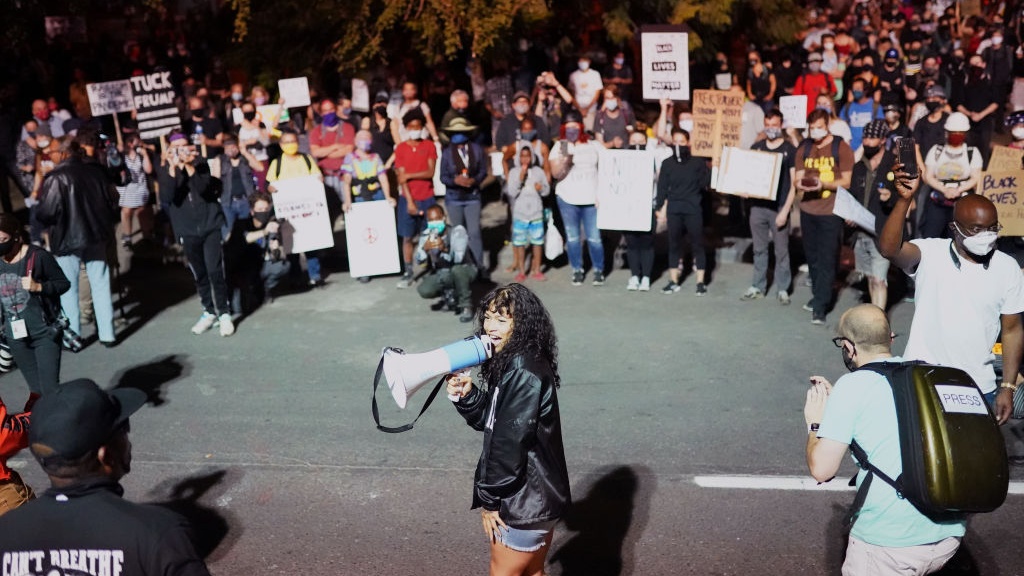Protests over police brutality and racism are still raging across the country despite the dip in news coverage. Most major cities are still seeing weekly demonstrations, and Seattle is no different.
A passionate group of protesters turned heads on Wednesday when they staged a large event in an upscale neighborhood in the West Coast city.
“Do you know that before your white a*s came here, this was all Black people? … Do you know people like you came in here and basically bought all the land from the Black people for less than what it was worth, kicked them out so you could live here? Do you know that?” an unnamed protester said as a crowd stood outside of apartment buildings.
“Cause if you don’t, now you f**king do — now do something about it! … So how do you plan to fix it? As a gentrifier, because you are part of that problem, how do you plan to fix it?” he added.
Seattle BLM protesters march through residential neighborhoods and demand white people give up their homes.
“Give up your house. Give Black people back their homes.” “what are you going to do about it? Open up your wallets.”pic.twitter.com/btRzqos0IR
— Katie Daviscourt???????? (@KatieDaviscourt) August 14, 2020
Another protester in the video said, "Give Black people back their homes! You’re sitting there comfortably — comfortable as f**k as if they didn’t help gentrify this neighborhood! I used to live in this neighborhood, and my family was pushed out, and you’re sitting up there having a good time with your other white friends!”
Other videos showed another section of the protest where demonstrators spoke about the effects of gentrification and their desire for something to be done about neighborhoods where residents are being pushed out.
Seattle is the third-most gentrified city in the country according to a study by the Federal Reserve Bank of Philadelphia. The city has seen some of the biggest protests in the country since people took to the streets after the killings of Breonna Taylor, Ahmaud Arbery and George Floyd earlier this year.
On Tuesday, Seattle Police Chief Carmen Best quit her job after the Seattle City Council announced it would be slashing 100 officers and $3 million from the police department’s $409 million budget, The Washington Post reported.
The Council gave us $1.6 million to hire the best, brightest and most diverse. Now they want me to layoff 100 of those officers. I can’t do that. pic.twitter.com/De85kvQlZd
— Chief Carmen Best (@carmenbest) August 11, 2020
In her resignation speech, Best criticized the council for trying to force her to fire the people she hired to try and diversify the city's police force. As Blavity previously reported, due to legal constraints, Best would only be able to fire the newest recruits instead of those with the highest number of complaints.
Best was also incensed that council members were planning to cut her salary as well. She was the city's first Black woman police chief, according to The Post.
“I regret deeply that she concluded that the best way to serve the city and help the department was through a change in leadership,” Seattle Mayor Jenny Durkan wrote in a letter to the police department.
But protesters have said Best has been at the helm of a violent police force that routinely used tear gas, rubber bullets and outright violence to quell the city's protest.
The Seattle Times covered a community listening session on Thursday run by the Seattle Office of Inspector General. Several people spoke during the event about permanent hearing loss and violent arrests.
“I ended up having to go to the ER. I am a 115-pound, 5-foot-4 woman who posed no threat to many officers in riot gear. I reject any characterization of them having any sort of restraint,” said Aisling Cooney.
“I don’t expect them to be more than humans, but I expect them to act with humanity, which I have not seen,” she added.
Cal Anderson right now#seattleprotest
#seattleprotestcomm
pic.twitter.com/CFVhAF9nG6— 'Baby' me and you'll be peeing through a catheter (@victoriamramon) August 14, 2020
Protests have continued in the city despite police shutting down a controversial protest area known as Capitol Hill Organized Protest, reports NPR.
